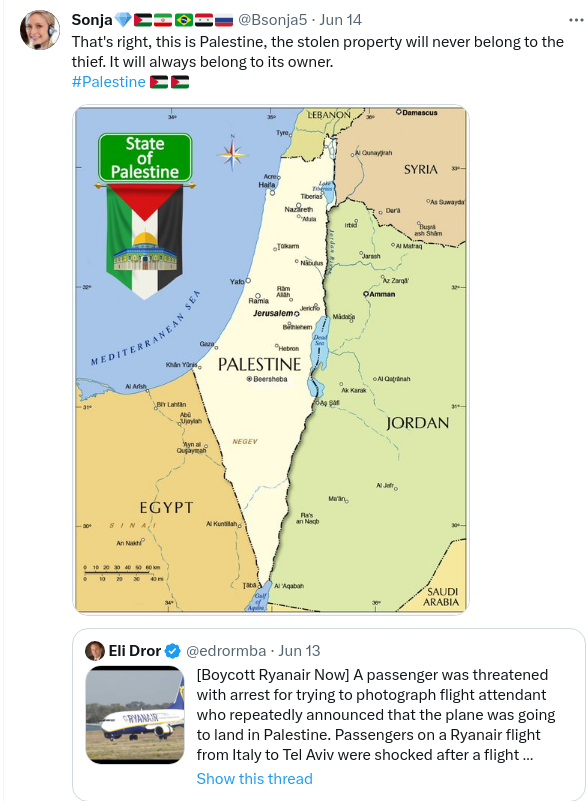Let say Jews have the right to have their own state and country. People who live in a place also have the same right to have their own government, to defend their land and its reserved (water, oil, mines) reservoirs properties, for them and generations that will proceed.
Those who talk about historical Palestine, may question why Jews immigrated there to establish their state, when the land has already its population. A guest should respect the host, not to prison the host and declare himself the real host. Is this a call for genocide, and a promotion of killing the Jews? Not necessarily. Even not necessarily a try to advertise the two-state solution. It may simply put forward the idea that Jews who were not already among the original population before the mass immigration are free to reverse-immigrate (go back) to their original homes, be it Europe, US, Russia, Africa or elsewhere. They are free to establish their own state somewhere not having its own population, or if the population there is loving to be a part of a new Jew state.
The original population's right to have their own state in their original land is more justified than the Jew immigrants' right to have their own state in a land they have just mass immigrated and it has its own population. That's all. It has nothing to say about killing the Jews there in Isreal and call for genocide, also it has nothing to say Jews have no right to have their own state, also it has nothing arguable about if there was a country (or state, government, nation) named Palestine before or not. Palestine was a historical land with a population, and that will suffice. If someone will rule the people there that should be selected among them, not from abroad.
The problem was not as easy to solve if we were talking about a mother country and its sub-lands having local government. For example, you may think of a country comprised of several sub-lands, each sub-land having its own properties and natural reservoirs. The sub-states may like to keep the whole advantages of their own properties and reservoirs for their own sake, but the central government try to manage the resources in the whole country, helping a a sub-state with another sub-state properties and vice versa. That will be great if the whole Earth will have a central government like that, sharing oil to the sub-states that need it but have it not, sharing water, food and other resources as well. The problem with Colonialism is the misuse of power, and mismanagement of the resources, and oppression that they apply to the people under their ruling, like what UK was doing in India, or what US is right now doing in almost everywhere on the Earth. When the problem is outlined about Palestine, Israel is not only a government with its body belonging to the outside of the land under consideration, but it is not a large state comprising of Palestine as one sub-state and many others as other sub-states. It is simply a mere substitute of the Palestine state itself. Therefore it is not comparable to when Palestine was a part of the Ottoman Empire. Ottoman Empire was broken, then the sub-lands were given to some families to rule there maybe as representatives of UK government, but anyway good or bad the rulers were almost domestic to their lands. But Palestine was offered to Jews immigrating massively from other countries to establish a state of their own. It could be given to a local Palestinian dictator like other Arab sub-lands were given to dictators, representing UK government there, serving for their benefits. But Palestine became an exception. So this became a place for debate.
PS. there is a reason why Colonialism is more interested to establish kingdoms instead of democracies (or real democracies). In real democracies they should satisfy the whole body of population to be able to find a share in their resources, but in kingdoms they only need to satisfy a family to use the whole resources for their own benefit, and this is the local dictator who should manage the people, either by satisfying them or by oppressing.
UPDATE. Maybe this much suffices to give a suggestion to the community. The OP's title reads Is mentioning "historical Palestine" acceptable for this site?, and this is now a suggestion that it shouldn't be considered antisemitic or have anything to do with the concept of genocide/oppression against Jews, and that following IHRA's definitions might itself be antisemitic (putting equal being a Jew and being a Pro-CURRENT-Israel-AS-IS, even if Israel's PM is accused for war crimes and crimes against humanity) if is studied unbiased.
